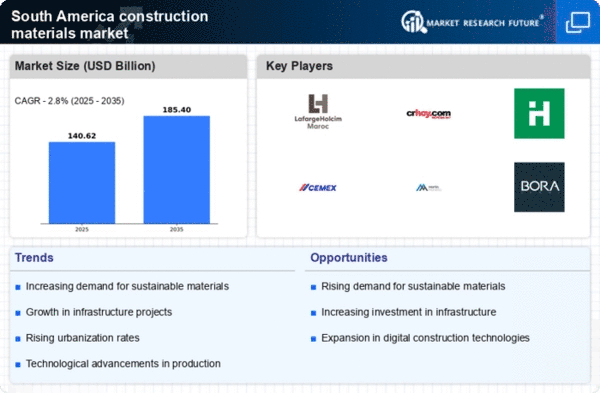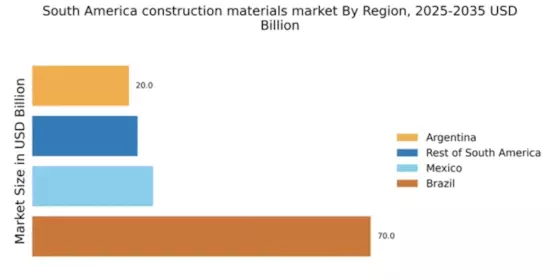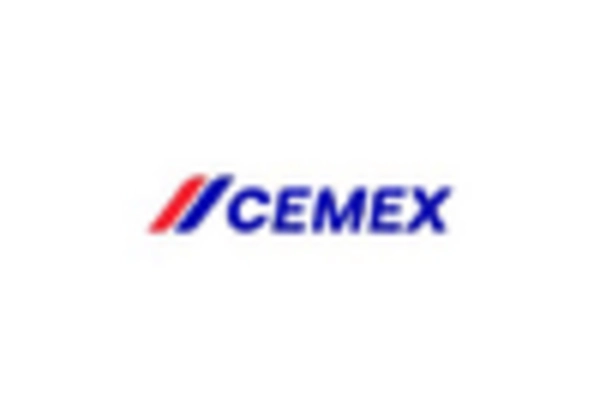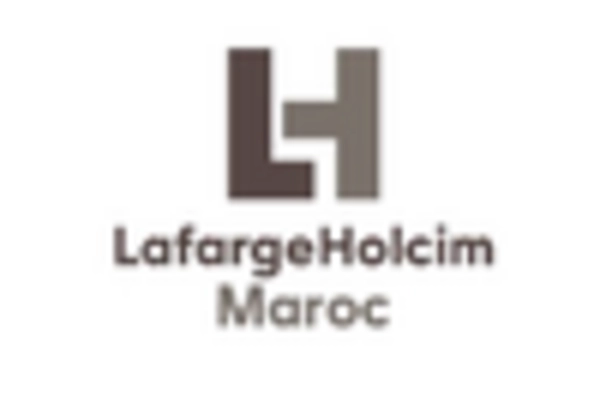Rising Urban Population
The increasing urban population in South America is a pivotal driver for the construction materials market. As cities expand, the demand for housing, commercial spaces, and infrastructure rises significantly. For instance, projections indicate that urban areas in South America could see a population increase of over 20% by 2030. This surge necessitates a substantial supply of construction materials, including cement, steel, and aggregates. The construction materials market must adapt to this growing demand by enhancing production capabilities and ensuring the availability of essential materials. Additionally, urbanization often leads to the development of new infrastructure projects, further stimulating the need for various construction materials. Consequently, the interplay between urban growth and construction material demand is likely to shape market dynamics in the region.
Economic Growth and Investment Trends
Economic growth in South America is a significant driver for the construction materials market. As economies expand, there is a corresponding increase in investment in residential and commercial construction projects. For instance, countries like Chile and Colombia are experiencing robust economic growth, with GDP growth rates projected to be around 3% to 4% annually. This economic momentum is likely to stimulate demand for construction materials, as businesses and individuals invest in new buildings and infrastructure. The construction materials market must be prepared to meet this rising demand, which may involve scaling production and improving supply chain logistics. Additionally, foreign investment in the region can further enhance market dynamics, as international companies seek to capitalize on growth opportunities.
Government Infrastructure Investments
Government investments in infrastructure are crucial for the construction materials market in South America. Various countries in the region are prioritizing infrastructure development to boost economic growth and improve living standards. For example, Brazil's government has allocated approximately $30 billion for infrastructure projects over the next five years, which is expected to significantly impact the demand for construction materials. These investments often focus on transportation, energy, and public facilities, creating a robust market for materials such as concrete, asphalt, and steel. The construction materials market is likely to benefit from these initiatives, as increased government spending translates into higher demand for essential materials. Furthermore, public-private partnerships are becoming more common, potentially leading to innovative approaches in sourcing and utilizing construction materials.
Environmental Regulations and Standards
Environmental regulations are increasingly influencing the construction materials market in South America. Governments are implementing stricter standards to promote sustainability and reduce the environmental impact of construction activities. For example, regulations may require the use of recycled materials or limit emissions from production processes. The construction materials market must adapt to these evolving regulations, which could lead to increased demand for eco-friendly materials. Companies that invest in sustainable practices may gain a competitive edge, as consumers and governments alike prioritize environmentally responsible options. Furthermore, compliance with these regulations can drive innovation in material production, leading to the development of new products that meet both regulatory requirements and market demands.
Technological Advancements in Construction
Technological advancements are transforming the construction materials market in South America. Innovations such as 3D printing, prefabrication, and advanced materials are reshaping how construction projects are executed. For instance, the adoption of 3D printing technology can reduce material waste by up to 30%, which is particularly beneficial in a region where resource efficiency is paramount. The construction materials market is witnessing a shift towards more sustainable and efficient practices, driven by these technological developments. Additionally, the integration of digital tools for project management and supply chain optimization is enhancing the efficiency of material usage. As these technologies become more prevalent, they are likely to influence the types of materials in demand, pushing the market towards more innovative and sustainable solutions.


















